Iran Reportedly Removed Cameras From US Sea Drones It Briefly Seized
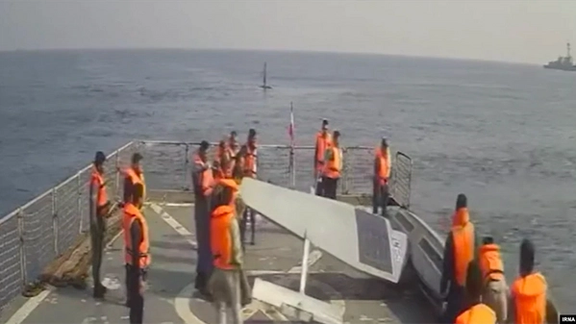
A new report says Iran has removed the cameras from two American sea drones it seized and released in the Red Sea on Friday.

A new report says Iran has removed the cameras from two American sea drones it seized and released in the Red Sea on Friday.
The Wall Street Journal quoted an unnamed US official as saying Friday afternoon that Iran returned the two captured maritime drones after being confronted by US destroyers but the unmanned vessels were missing their cameras.
The official, however, claimed that it was not clear if the Iranians kept the cameras or if they fell off when the Iranian navy ship hauled the drones out of the water and later put them back, implying that the cameras on both drones could have fallen off accidentally. The unmanned drones are designed to stay in all weather condition in the sea.
US officials have said that the cameras, radars, sensors and other equipment for navigation and data collection on the drones are commercially available and the technology does not store sensitive or classified information. But retaining the cameras and inspecting the drones up close could give Iran a better idea of the system’s capabilities, which is part of the US advanced aerial and maritime sensors in the region, known as Task Force 59, designed to use artificial intelligence to monitor Iran’s activities at sea.
The disclosure about the cameras is the latest twist in the story of encounters between Iranian and US naval forces this week.
On Tuesday, the US Naval Forces Central Command said that the US Navy prevented a support ship from Iran’s Revolutionary Guard’s Navy -- named Shahid Baziar -- from capturing an unmanned vessel operated by the US 5th Fleet in the Persian Gulf.
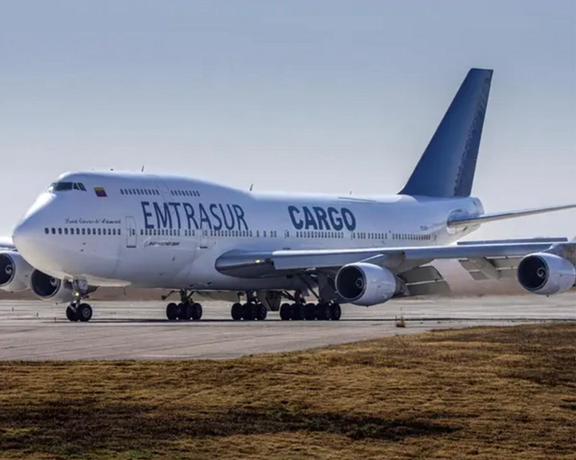
In an interview the Iranian pilot of a Venezuelan cargo plane grounded in Argentina three months ago has denied any ties to Iran’s Revolutionary Guards (IRGC).
In the interview with Al Mayadeen Espanol published Friday, Captain Gholamreza Ghasemi reiterated the claim that he is a flight instructor and had no ties to the Iranian military except for fighting in the Iran-Iraq War (1980-1988) as a volunteer in the Basij Popular Mobilization Forces.
The crew of the plane have been held in Buenos Aires since early June over suspected connections with Iran's Revolutionary Guard’s Quds Force and links to international terrorism.
Gerardo Milman, an Argentine lawmaker, told Iran International in June that Iranians aboard the Venezuelan plane planned “attacks on human targets.” Milman also alleged that Captain Ghasemi was a senior official of Qods (Quds) force.
Ghasemi told Al Mayadeen, a network close to the Islamic Republic, he had informed the Argentinian authorities before their arrival in Buenos Aires on June 8 that there were two Venezuelans onboard theBoeing 747 who were undergoing training by him.
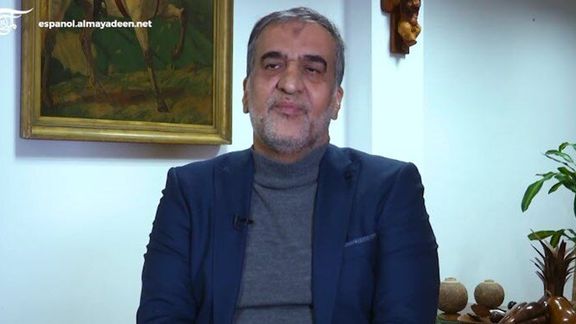
According to Ghasemi, everything appeared normal when the plane entered Argentina and unloaded its cargo and took off for Paraguay. Apparently after returning to Buenos Aires following Paraguay’s denial of entry -- Argentinian authorities said they would not supply fuel to the plane when it wanted to leave. “If we had been supplied with fuel, we would have left the country, and nothing would have happened.”
“Since that day, there have been a series of issues that the Argentinians have been using as pretexts to justify their action,” he added.
The plane had to return to Argentina when Uruguay refused to allow it to land. “I have never witnessed a case anywhere in the world where a country grants permission for planes to fly in its airspace and an entry permit, and suddenly cancels them in the middle of a flight. This is the first time I've seen something like this in 20 years,” Ghasemi said.
Head of the Paraguayan National Intelligence Secretariat Esteban Aquino told the country’s Spanish language digital newspaper ABC Digital on June 18 that Ghasemi had ties with the IRGC despite claims by Argentina that no evidence linked the case to the Revolutionary Guards’ Qods Force.
Ghasemi also said that many Argentine officials have said in interviews that there is no pending case against the flight crew and that they can leave Argentina but that “the law should be respected” so they are waiting for the court and the judicial authorities’ decision on the matter.
The US Justice Department said August 2 that it was seeking possession of the cargo jet because it was previously owned by Iran’s Mahan Air that allegedly has ties to terror groups.
Iran has denied that the Boeing 747 belongs to Mahan Airlines, sanctioned by the US in 2008 for links to the Qods Force, the IRGC’s extraterritorial intelligence and secret ops outfit, which has been listed as a terrorist organization by the United States.
Early in 2022, Venezuela’s Conviasa decided to set up a cargo division that came to be called Emtrasur Cargo and its first plane was the Boeing 747-300M bought or leased from Mahan airlines and christened ‘Louisa Caceres Arismendi.’
The Israeli embassy in Buenos Aires also released a statement on June 17, saying that the Boeing 747 was used by the Iranian company Mahan Air and transported “a group of Iranian officials, including a senior executive of the airline Qeshm Fars Air,” accused of transporting weapons for Hezbollah during the civil war in Syria.
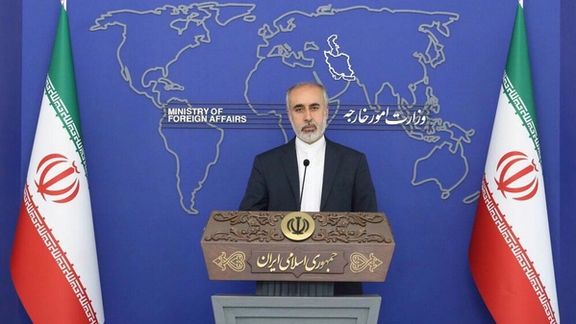
Iran has reiterated its call for the release of its former officials imprisoned in Europe while a former hostage says Tehran is on the hunt for both Swedes and Belgians to exchange with them.
Foreign ministry’s spokesperson Nasser Kanaani said on Saturday that Assadollah Assadi, serving a 20-year sentence in Belgium over a terror attack in Paris, and former jailor Hamid Nouri, sentenced to life in prison in Sweden for his role in 1988 prison purges, should be released as their trials were illegal.
He made the remarks as Kylie Moore-Gilbert, an academic previously jailed in Iran for over two years, tweeted on Saturday that “Basically, Iran is on the hunt for both Swedes and Belgians to exchange for Nouri and Assadi,” and shared a report about two Swedes who were sentenced to years in prison on "drugs charges" over prescription painkillers found in their luggage.
Kanaani’s remarks came as numerous Iranian and foreign rights groups have expressed concerns about a prisoner exchange treaty between Belgium and Iran that potentially condones hostage-taking policy by the Islamic Republic and undermines accountability for Iranian officials convicted for acts of terrorism abroad.
Assadi, 50, a former attaché at the Iranian embassy in Austria, was convicted of plotting to bomb a gathering of the exiled opposition group Mujahedin-e Khalq Organization (MEK) near Paris on June 30, 2018. Iran says Nouri’s detention is driven by “false allegations” made by the MEK.
Iran has imprisoned at least a dozen dual nationals and foreigners – most of whom on disputed spying charges -- in recent years as Tehran negotiates for money and influence with the West. Most of them are held on disputed spying charges.
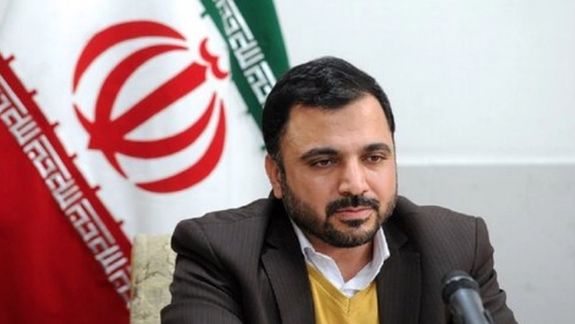
Iran's Information and Communications Technology Minister Issa Zarepour has denied an accusation that his family members have dual nationality.
He made the remarks in an Instagram post on Friday after Iran International released travel documents that reveal two of Zarepour's children hold Australian citizenship.
Zarepour claimed that none of his family members and even immediate relatives has dual nationality.
In early August, Mohammad Saleh Hashemi Golpayegani, the secretary of Iran’s Headquarters For Enjoining Right And Forbidding Evil, tasked with promoting the clerical regime’s interpretation of Islamic laws, criticized the high number of “senior officials” whose relatives are living abroad, confirming that there are over 4,000 sons and daughters who have left Iran.
Earlier in the year, General Morteza Mirian, the commander of Iran’s Revolutionary Guards’ ground operations, said that the relatives of these officials should be “tracked” so as not to be allowed back to Iran to take up managerial positions.
A figure of 5,000 “descendants” of senior officials living abroad was cited in 2020 by Mohammad Gharazi, communications minister between 1985 and 1997 who was at the time considered a presidential hopeful. In November 2021, Alireza Salimi, a member of parliament, suggested that officials under former President Hassan Rouhani, including deputy ministers had moved to Europe due to fears they would be banned from leaving the country.
In 2019, Brian Hook, special representative for Iran (from 2018 to 2020) under President Donald Trump told Iran International that “children of Islamic Republic officials live rich and comfortable lives in the United States and other countries while Iranian people live in terrible conditions.” Hook said this showed “the regime’s hypocrisy.”
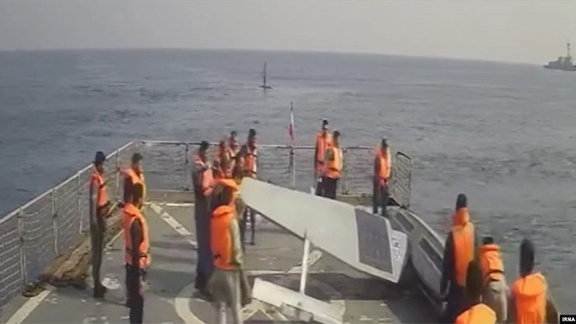
Iran says its navy seized two American sea drones in the Red Sea but later released them, the second such incident involving the US Navy’s drone fleet in the Mideast this week.
Iran’s state broadcaster reported on Friday, "The (Iranian navy) frigate Jamaran seized the two vessels on Thursday to prevent any possible accident after issuing warnings to the US fleet," accusing the unmanned vessels of jeopardizing maritime safety.
“After securing the international shipping waterway, the Naval Squadron No. 84 released the two vessels in a safe area,” the report added.
The state television also aired footage that appeared to show more than a dozen lifejacket-wearing Iranian navy personnel pushing two Saildrone Explorers into the sea from the deck of their vessel, as another warship could be seen in the distance.
Later in the day, Commander Timothy Hawkins, a spokesman for the Navy’s Mideast-based 5th Fleet, confirmed the incident to The Associated Press but declined to elaborate.
On Tuesday, the US Naval Forces Central Command said that ithe US Navy prevented a support ship from Iran’s Revolutionary Guard’s Navy -- named Shahid Baziar -- from capturing an unmanned vessel operated by the US 5th Fleet in the Persian Gulf.
The 5th Fleet launched its unmanned Task Force 59 last year, with an area of responsibility covering the crucial Strait of Hormuz, the narrow mouth of the Persian Gulf through which 20 percent of all oil passes, and stretching as far as the Red Sea reaches near the Suez Canal, the waterway in Egypt leading to the Mediterranean, and the Bab el-Mandeb Strait off Yemen.
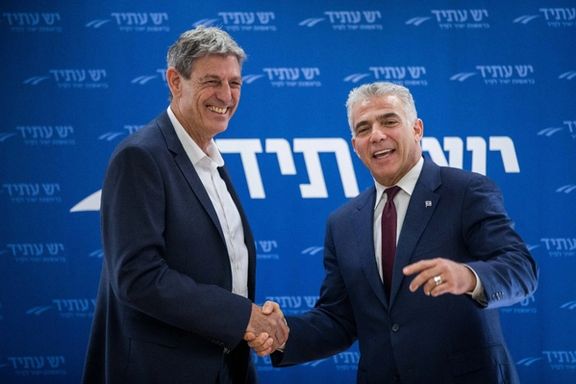
Israel believes Western powers can reach a better nuclear deal with Iran, a senior lawmaker said on Friday, as attempts to revive a 2015 pact continue with no final deal yet.
"We must draft a much better deal with a much longer stick. And this is what we're not seeing," Ram Ben-Barak, head of parliament's foreign affairs and defense committee, said in a radio interview in Israel.
Tehran's insistence that the International Atomic Energy Agency (IAEA) close its probes into uranium traces found at three undeclared sites before the nuclear pact is revived is one key hurdle.
After 16 months of indirect talks between Tehran and Washington, the European made a proposal in August but key differences remain between Iran and the US.
The open probes and future inspection were Israel's main concerns with the current deal, Ben-Barak said.
"We must get honest and real answers about what they did there," he said.
Ben-Barak, who once served as deputy director of Israel's Mossad spy agency, said Iran is not as strong as some people may think and has been struggling under sanctions. This could lead Tehran to give up on its nuclear ambitions entirely, whether by diplomacy or military power, he added.
Israel has pledged never to allow Iran to obtain atomic weapons, saying Tehran advocates its destruction. Iran denies ever seeking nuclear arms.
"What Israel wants is something better in place of this deal. Something better means telling the Iranians 'listen, you will not have a nuclear program'," he said.
Reporting by Reuters